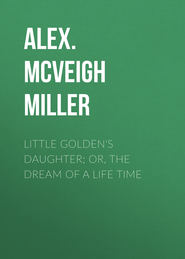По всем вопросам обращайтесь на: info@litportal.ru
(©) 2003-2024.
✖
Laurel Vane; or, The Girls' Conspiracy
Настройки чтения
Размер шрифта
Высота строк
Поля
They had come to the pretty rustic fence that bordered the lawn. Below it was the public road, beyond this the wide, beautiful river, with the white sails coming and going on its glassy breast. Beatrix sunk down on a convenient seat with a crimson, dismayed face. Some of the flowers fell from her overskirt in the surprise with which she regarded him.
"Oh, what have I said? I didn't mean that—never!" she cried, as he stooped to restore her treasures. "I wouldn't have you go away from your beautiful home for me, Mr. Le Roy."
"Very well, I will stay. I dare say Eden is wide enough for us to keep out of each other's way," he answered, as he sat down by her side.
"Yes, surely," she cried; "and if—if you will only tell me how, I won't bother you—I won't come in your way at all."
"Very well," grimly. "We will both stay at Eden and compromise that way. We will try not to intrude upon each other. My favorite haunt is the library. If you will keep out of there, you may have the right of way in the rest of the house without materially disturbing me."
Palpable dismay lowered over the lifted face that looked so lovely in the golden sunlight.
"The library? And the books are all there—aren't they?" she asked, with a note of keen yearning in her voice.
"Yes; do you like books?" he asked, curiously.
"I love them," she answered, discarding the word "like" as she had done about the flowers. There was no half way strain in her nature. Fervent, ardent, impetuous, the word was too cold for her.
Those things that pleased her she loved.
"Then, perhaps I will lend you some books sometimes, if you will only keep out of my sanctum," he said, coolly. "Do you promise?"
"Yes, I promise," she replied, with a gentle, smothered sigh.
Then suddenly she lifted her eyes and asked him the last question he would have expected to hear from a girl nurtured in the lap of wealth and luxury.
"Mr. Le Roy, if you were a girl like I am—and if you hadn't any parents, nor home, nor friends—nor any money—nor any practical education—what would you do to earn an honest living?"
There was a palpable anxiety in voice and face. She had grown very pale, her dark eyes were distinctly wistful.
"She is thinking of that obnoxious lover. She would even dare poverty for his sake," he said to himself in displeasure.
Aloud he answered carelessly:
"It is hard to say what I should do in such a case, Miss Gordon. I believe I should throw myself into that beautiful river yonder and so end all."
In the dark after-days he remembered those words.
CHAPTER VI
Beatrix Gordon looked at the beautiful river with wide, dark eyes. The summer sunshine gilded the blue waves, the white sails dotted its wide expanse like fairy shallops gliding to and fro. It was grand and dazzlingly beautiful, but the young girl shivered as she thought of the dark depths below. She turned from it to look gravely into St. Leon Le Roy's handsome face with its cold, cynical eyes.
"You would throw yourself into the river and so end all," she repeated. "Oh, Mr. Le Roy, is it so hard for a poor girl to live that suicide is the least choice of evils?"
Her little hands clasped each other tightly over the mass of glowing flowers in her lap, and her red lips trembled with earnestness. He looked at her in something like wonder.
"I do not see why Mr. Gordon's daughter should trouble herself over such a question," he said. "But since you ask me I must answer yes. The world is full of pitfalls for the young and beautiful girl who has her own living to gain. Were I in the situation you describe, I believe I should speedily end the struggle with fate by a leap into the river."
These hastily spoken words, too, he was fated to recall in an hour of which he dreamed not now.
Beatrix did not answer him. She sat very still, looking before her with a strange, far-away expression on her face. A long, deep, unconscious sigh quivered over her lips.
"You are troubled over what I said—why?" he asked, curiously.
And the girl answered, with a shiver:
"I am afraid of life."
St. Leon began to feel vaguely interested in this girl whose coming he had dreaded so much. She was not like other young ladies he had known—not what he had expected the rich Mr. Gordon's daughter to be. There was a spice of originality about her. Why should she, the petted child of wealth and luxury, think about these things of which she had talked? Was it because her lover was poor?
He did not like to think of that lover from whom her parents wished to separate her. She was a child, he said to himself—too young to burn her heart in the flame of love.
"I do not see why you should fear life. It is likely to prove very fair and bright to you, if you do your duty—if you implicitly obey the wishes of your parents," he said, watching her keenly.
The lovely face flushed crimson, but she made him no answer. She played with her flowers nervously. She was afraid of St. Leon Le Roy's keen, merciless eyes.
"You do not wish me to lecture you upon your duty?" he said, after waiting in vain for her to reply.
"No, I do not think I do," she replied, frankly.
"Then I beg your pardon. Indeed, I am not worthy of lecturing any one upon that cold, hard word, duty," he said to himself rather than her. "I have not been a very dutiful son myself," a shadow crossing his dark features.
Beatrix again had no answer ready.
She went on quietly grouping her flowers into a large bunch. He watched the white hands with a lazy, æsthetic pleasure in their beauty as they gleamed among the crimson flowers of which she had gathered a larger quantity than of any other color.
He began to talk to her of the city where she lived, of the places she had visited, of people whom he supposed the Gordons would know. He was amazed at her ignorance on subjects where he would have supposed her to be at home.
"I have been to very few places, and I know very few people," she said, blushing. "I—I haven't been introduced into society yet. I am too young."
"Then where did she pick up that lover?" he asked himself. "She must have become infatuated with her dancing-master or her music-master."
But that evening when Mrs. Le Roy opened the piano and asked her to play, Beatrix begged to be excused. Being pressed, she declared that she had never learned the piano, she did not care for music—at least not very much.
No one expressed the surprise they felt. St. Leon played an aria for his mother, then they closed the piano.
"So it was not her music-master who won her heart. The circle narrows down to the professor of the terpsichorean art," he said to himself.
"My dear, I have been watching you closely," said Mrs. Le Roy, suddenly. "You do not at all resemble your mother. She had blue eyes, yours are black. Her features were quite different from yours. I have seen your father, but I forget how he looked. I suppose you are like him."
"Yes, I am like my father," Beatrix answered, but her face crimsoned, and she looked as if she were about to burst into tears. She commanded herself with an effort, and a little later, declaring that her head ached, she begged to be excused, and left the room.
"Poor girl! she is very unhappy!" said Mrs. Le Roy. "Isabel Gordon was very careless to let that child have a lover! She has no business out of the school-room."
CHAPTER VII
Beatrix went swiftly to the pretty dressing-room, where the maid was, busy sewing on a dinner-dress of pink nuns' veiling for her beautiful young mistress. She sunk down upon a chair and looked at Clarice with somber, miserable eyes.
"Oh, Clarice, I shall have to give it all up," she panted. "They suspect me—I am quite sure they do!"











